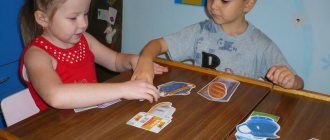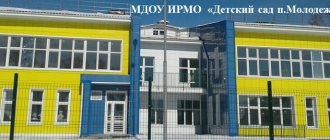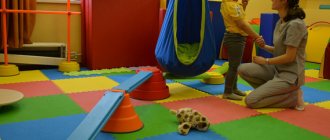| Can parents themselves determine whether a speech therapist is needed? |
| Can parents correct their child’s speech themselves? |
| How is the student screening process carried out? |
| How often do I need to attend classes? |
| How long do I need to attend speech therapy classes? |
| Is it possible for parents to be present at classes? |
| Is it necessary to complete the tasks that the speech therapist gives at home? |
| What materials does the speech therapist use in classes? |
At what age should a child be taken to a speech therapist?
By the age of 5, the child’s speech should already be formed. The favorable period for the active development of speech is the age of two to three years. It is during this period that parents should ask whether everything is fine with the child’s speech and visit a speech therapist for consultation. Parents need to monitor the dynamics of their child’s speech development. After all, what was the norm at three years old becomes a lag for four years. If the mother had problems during pregnancy or childbirth, and the child was seen by a neurologist, then it is necessary to especially carefully monitor the development of speech. The sooner a speech therapist detects speech disorders (if any), the easier it will be to correct everything. To the begining
Can parents themselves determine whether a speech therapist is needed?
Children acquire correct speech gradually, over several years. Each age has its own norm. By the age of one year, a normally developing child already uses 3-4 “babble” words, understands individual words, and relates them to specific objects. Understands simple instructions accompanied by gestures (“where is mom?”, “give me a pen,” “no”). By the age of two, he uses sentences of two or three words, understands and correctly follows two-step instructions (“go to the kitchen and bring a cup”), and has a vocabulary of at least 50 words. By the age of two, the child already correctly pronounces the sounds: p, b, m, f, v, t, d, n, k, g. If by the age of 2.5 the child has not formed elementary phrasal speech, it means that the rate of his speech development is lagging behind from the norm. In the speech of a three-year-old child, the ability to correctly connect different words into sentences is gradually formed. From a simple two-word phrase, he moves on to using a complex phrase using case forms of singular and plural nouns, uses simple prepositions (on, in, under, for, with, from) and conjunctions (because, if, when) in a sentence. By 3.5 years, the number of adjectives increases significantly. In the speech of a four-year-old child, complex and complex sentences are already encountered, prepositions are used (by, before, instead of, after, because of, from under), conjunctions (what, where, how much). By this time, whistling sounds (s, z, ts) are mastered, as well as s, e, and somewhat later hissing sounds (sh, zh, ch, shch). The sounds r, l usually appear by 5–5.5 years. By the age of five, the child fully masters everyday vocabulary and uses general concepts (clothing, vegetables, etc.). There are no longer omissions or rearrangements of sounds and syllables in words; the only exceptions are some difficult unfamiliar words (excavator, etc.). All parts of speech are used in the sentence. The child masters all the sounds of his native language and uses them correctly in speech. If your child's speech differs significantly from these norms, you should immediately contact a speech therapist. However, parents often get used to their child’s speech and do not notice many problems in his development, especially if he is the only one in the family. Therefore, it is recommended to visit a speech therapist for the first time at the age of 3 and then annually for preventive purposes. If your child’s babbling has faded, and the first words have not appeared even by the age of 2, then you should seek help earlier. To the begining
The work of a speech therapist. Speech therapy - Speech therapy leisure “We remember and are proud!”
Publication “Speech therapy leisure “Remember and...” Speech therapy leisure on the topic “Remember and be proud!” Goal: to systematize and consolidate the knowledge of senior preschool children about the Great Patriotic War. Objectives: educational: - clarify and activate vocabulary on the topic; - expand knowledge about the military...
Image library "MAAM-pictures"
Consultation for parents “How to understand when to contact a speech therapist?” When to go to a speech therapist! Is this even necessary? Let's try to figure it out. There are several obvious situations when you can understand that it is still worth going to a specialist. So, the situations: 1. A 2.5 year old child does not speak in simple phrases (mom let me drink, dad let’s go for a walk. In this...
Self-education of a speech therapist teacher “Use of bioenergoplastics in correcting sound pronunciation” preschool age Goal: to improve your professional level. The use of bioenergoplastics in correcting sound pronunciation in children of senior preschool age; develop coordination of the articulatory apparatus and fine motor skills of the fingers; activate memory, voluntary attention,...
Scenario of an autumn holiday for children of a speech therapy preparatory group for school “Autumn gatherings with Masha and Dunyasha” Scenario of an autumn holiday for children of a speech therapy preparatory group for school (No. 9) “Autumn gatherings with Masha and Dunyasha” Purpose: To create a festive atmosphere. Objectives: To promote the development of musical and aesthetic taste in children; Enrich artistic ideas about...
Can parents correct their child’s speech themselves?
It’s impossible to say for sure here. Sometimes it is enough to attract the baby's attention to the correct pronunciation of a sound to get a positive effect. However, if a child has severe speech problems, books alone cannot correct speech. Requires knowledge and special equipment. For example, speech therapy probes are used to produce sounds that the child does not pronounce; without them, it is very difficult to teach the child to pronounce sounds. In other cases, it is first necessary to develop articulatory muscles with the help of articulatory gymnastics. However, if, despite your efforts, your child has not learned to pronounce sounds correctly after a month of lessons, it is best to contact a professional. Further attempts to correct the pronunciation may aggravate the problem - for example, it may reinforce the child’s incorrect pronunciation or even discourage the child from studying. Pay special attention to your own speech, since for children aged 1 to 6 years, parents’ speech is a role model and the basis for subsequent speech development. To the begining
Methodological materials for speech therapist teachers
Contained in sections:
- Methodological materials for teachers and educators 27508
- Speech development. Speech development of children 15164
Includes sections:
- Articulation. Articulation gymnastics 1526
- Bilingualism, bilingualism 205
- Bioenergoplastics in working with children 118
- Dysarthria 236
- Dysgraphia and dyslexia. Prevention and correction 262
- Kinesiology. Kinesiological exercises and games for children 433
- Speech therapist consultations for parents 1543
- Corrective work. For teachers of correctional groups 303
- Corrective classes. Notes for correctional groups 3997
- Speech therapy classes 9273
- Speech therapy and speech holidays and entertainment. Scripts 1892
- Speech therapy games 1390
- Speech therapy rooms. Educational Environment 201
- Logorhythmics. Logorhythmic exercises 1423
- Fine motor skills 11373
By groups:
- Senior group
- Preparatory group
- Middle group
- Junior group
Showing publications 1-10 of 8118. All sections | The work of a speech therapist. Speech therapy
New
Photo
The best
Health-saving pedagogical technologies in the work of a speech therapist with children with ASD In recent years, our country has paid special attention to the rehabilitation and education of children with disabilities. Children with autism spectrum disorders constitute a large group of them who, until recently, did not have the opportunity to receive...
Methodological recommendations for conducting speech therapy massage In speech therapy practice, several types of massage can be used. The main thing is differentiated (strengthening or relaxing)
massage based on classical massage techniques.
In addition, speech therapy practice uses massage of biologically active...
How is the student screening process carried out?
The speech therapy examination is based on the general principles and methods of pedagogical examination: it is complex, holistic and dynamic, but at the same time it has its own specific content, aimed at analyzing speech disorders. Each speech disorder is characterized by its own set of symptoms, and some of them turn out to be basic for each disorder, core, while others are only additional. The speech therapist conducts a speech examination in various types of activities of the child - play, study, and observes him in communication with others. A speech therapist studies and diagnoses: 1. The structure and functions of the speech apparatus. 2. Sound pronunciation. 3. Vocabulary. 4. The grammatical structure of speech. 5. Phonemic awareness. 6. The syllable structure of the word. 7. Coherent speech of the child. 8. Reading and writing skills. As a result, the examination becomes comprehensive and makes it possible not only to analyze speech disorders, but also to outline a plan for the most effective help. To the begining
How long do I need to attend speech therapy classes?
Everything is very individual and depends on a number of factors:
- From the cause of the speech disorder, the state of the child’s health, the level of preparedness to complete tasks, the level of sociability, the frequency and regularity of visits, and, very importantly, the degree of parental participation!
- It often happens that a child, in addition to a delay in speech development, also has additional somatic problems. It is more difficult for weak children; they get tired quickly, so the results of their work appear later.
In any case, the speech therapist looks at the child, and not at the diagnosis. Even a weakened child can pleasantly surprise with his hard work and desire to learn. The main thing is to find the key to the little heart. Remember that only the complex influence of specialists (speech therapist, doctor, educators, parents) will help to qualitatively improve or correct complex speech disorders. To the begining
Is it possible for parents to be present at classes?
Yes, it's possible. This is especially true for children aged 3 to 5 years. It is these children who find it most difficult to part with their mother. The parent may not be present at the lessons when it becomes clear that the child remains painlessly and happily with the teacher. But we do not welcome the constant presence of parents in classes, especially if parents begin to interfere in the course of the lesson without the consent of the teacher. As our experience shows, the constant presence of parents in the case when the child has already adapted to the new environment not only does not help, but also interferes with the learning process. To the begining
Features of the work of a teacher-speech therapist in educational organizations with children with disabilities of different categories
The user, by registering, leaving a request for a call back or filling out any other form on the website https://pedsoyuz.rf and its subdomains (selling pages, landing pages, etc.), agrees to accept this Consent to the processing of personal data (hereinafter - Agreement).
Acceptance of the offer of Consent is registration on the website, filling out the application form for a call back or any other form. The user gives his consent to the Union “Professionals in the field of educational innovations”, which owns the website https://pedsoyuz.rf and which is located at 123104 Moscow, Bolshaya Bronnaya, 23, building 1, office 511, to process his personal data with the following conditions:
- This Consent is given to the processing of personal data, both without the use of automation tools and with their use.
- Consent is given to the processing of the following personal data: last name, first name, patronymic; contact phone numbers; email addresses.
- The following personal data is publicly available: last name, first name, patronymic; contact phone numbers; email addresses.
- The purpose of processing personal data: compliance with the requirements of the Constitution of the Russian Federation, federal laws and other regulations, internal acts of the Union “Professionals in the field of educational innovations”.
- The grounds for processing personal data are: Art. 24 of the Constitution of the Russian Federation; Article 6 of Federal Law No. 152-FZ “On Personal Data”; Charter of the Union “Professionals in the field of educational innovations”.
- During processing of personal data, the following actions will be performed: collection and systematization, accumulation, storage, clarification (updating, changing), extraction, use, transfer (distribution, provision, access), deletion.
- The transfer of personal data to third parties is carried out on the basis of the legislation of the Russian Federation, an agreement with the participation of the subject of personal data or with the consent of the subject of personal data.
- Personal data is processed until the termination of the contractual relationship. Also, the processing of personal data may be terminated at the request of the subject of personal data. Storage of personal data recorded on paper is carried out in accordance with Federal Law No. 125-FZ “On Archival Affairs in the Russian Federation” and other regulatory legal acts in the field of archival affairs and archival storage.
- Consent is given, inter alia, to the possible cross-border transfer of personal data and information (advertising) alerts.
- Consent may be revoked by the subject of personal data or his representative by sending a written statement to the Union of Professionals in the Field of Educational Innovation or its representative at the address indicated at the beginning of this Consent.
- If the subject of personal data or his representative withdraws consent to the processing of personal data, the Union "Professionals in the Field of Educational Innovation" has the right to continue processing personal data without the consent of the subject of personal data if there are grounds specified in paragraphs 2 - 11 of part 1 of article 6, part 2 of article 10 and Part 2 of Article 11 of Federal Law No. 152-FZ “On Personal Data” dated June 26, 2006.
- This consent is valid all the time until the termination of the processing of personal data specified in clause 8 of this Consent.
Is it necessary to complete the tasks that the speech therapist gives at home?
All advice from our teachers is advisory in nature. But if you want to get a positive result from classes and make it easier for your child to learn the material, you need to follow the recommendations. Homework is not so voluminous and complex, and not every child is given it, but only those who really need it. After all, sometimes we (parents) rack our brains about what to do with our child and what to do with it. And here you don’t have to ask this question, you will simply follow the teacher’s instructions, for the benefit of you and your baby. To the begining
What materials does the speech therapist use in classes?
The teacher-speech therapist uses the following equipment and inventory during the lesson:
- Speech therapy album, pictures, materials for diagnosing the pronunciation of sounds;
- Mirror;
- Balls, soap bubbles, cotton wool, wind for breathing exercises;
- A set of speech therapy instruments (spatulas, probes, brushes) for producing sounds
- Cards, books, manuals for automating sounds in speech;
- Literature used in the process of speech therapy classes.
- Pencils, markers, albums.
All speech therapy equipment is sanitized every time after use in class. To the begining
Websites for speech therapists of preschool educational institutions
For speech therapists of preschool educational institutions, card indexes on various lexical topics, demonstration material, and game aids are available.
A unique feature of all the web resources presented is that parents of children with speech impairments will find many useful tips that can be used when working with their children at home.
The goal of everyone involved in webmastering on speech therapy topics is to help speech therapists in kindergartens, schools, children's centers, and other educational and health care institutions organize correctional work with children with speech pathology.








